#BatWeek with CSU: Day 4! Today we feature research conducted by the Stoner Lab at the Warner College of Natural Resources focused on the population #ecology & #conservation of migratory long-nosed #bats. #CSUhangswithbats #BatWeek2020  https://abs.twimg.com/emoji/v2/... draggable="false" alt="🦇" title="Fledermaus" aria-label="Emoji: Fledermaus">
https://abs.twimg.com/emoji/v2/... draggable="false" alt="🦇" title="Fledermaus" aria-label="Emoji: Fledermaus"> https://abs.twimg.com/emoji/v2/... draggable="false" alt="🦇" title="Fledermaus" aria-label="Emoji: Fledermaus">
https://abs.twimg.com/emoji/v2/... draggable="false" alt="🦇" title="Fledermaus" aria-label="Emoji: Fledermaus"> https://abs.twimg.com/emoji/v2/... draggable="false" alt="🦇" title="Fledermaus" aria-label="Emoji: Fledermaus">
https://abs.twimg.com/emoji/v2/... draggable="false" alt="🦇" title="Fledermaus" aria-label="Emoji: Fledermaus">
The Stoner Lab specifically studies the relationship between the abundance of these nectar-feeding bats and local plant food availability around their largest known roost in New Mexico. #CSUhangswithbats #BatWeek2020
#Bat super facts! If you are a fan of tequila or mezcal, you can thank our long-nosed bats!  https://abs.twimg.com/emoji/v2/... draggable="false" alt="⬇️" title="Pfeil nach unten" aria-label="Emoji: Pfeil nach unten"> Learn why
https://abs.twimg.com/emoji/v2/... draggable="false" alt="⬇️" title="Pfeil nach unten" aria-label="Emoji: Pfeil nach unten"> Learn why  https://abs.twimg.com/emoji/v2/... draggable="false" alt="⬇️" title="Pfeil nach unten" aria-label="Emoji: Pfeil nach unten"> #CSUhangswithbats #BatWeek2020
https://abs.twimg.com/emoji/v2/... draggable="false" alt="⬇️" title="Pfeil nach unten" aria-label="Emoji: Pfeil nach unten"> #CSUhangswithbats #BatWeek2020
#Bat super facts! While many bats found in the United States hibernate during the winter, the three species of nectar-feeding bats found in the United States are all migratory species. #CSUhangswithbats #BatWeek2020
#Bat super facts with the Stoner Lab at CSU Long-nosed bats can travel as much as ~60 miles round-trip between their roosts to nightly foraging grounds. This exceeds the known travel distances of other nectar-feeding bats! #CSUhangswithbats #BatWeek2020
#Bat #myths busted by the Stoner Lab at CSU: Bats are not blind!  https://abs.twimg.com/emoji/v2/... draggable="false" alt="⬇️" title="Pfeil nach unten" aria-label="Emoji: Pfeil nach unten">Learn more
https://abs.twimg.com/emoji/v2/... draggable="false" alt="⬇️" title="Pfeil nach unten" aria-label="Emoji: Pfeil nach unten">Learn more https://abs.twimg.com/emoji/v2/... draggable="false" alt="⬇️" title="Pfeil nach unten" aria-label="Emoji: Pfeil nach unten"> #CSUhangswithbats #BatWeek2020
https://abs.twimg.com/emoji/v2/... draggable="false" alt="⬇️" title="Pfeil nach unten" aria-label="Emoji: Pfeil nach unten"> #CSUhangswithbats #BatWeek2020
#Bat #myths busted by the Stoner Lab at CSU: #Vampire bats do not suck blood!  https://abs.twimg.com/emoji/v2/... draggable="false" alt="🚫" title=""Betreten verboten!"-Zeichen" aria-label="Emoji: "Betreten verboten!"-Zeichen">
https://abs.twimg.com/emoji/v2/... draggable="false" alt="🚫" title=""Betreten verboten!"-Zeichen" aria-label="Emoji: "Betreten verboten!"-Zeichen"> https://abs.twimg.com/emoji/v2/... draggable="false" alt="🧛" title="Vampir" aria-label="Emoji: Vampir">
https://abs.twimg.com/emoji/v2/... draggable="false" alt="🧛" title="Vampir" aria-label="Emoji: Vampir"> https://abs.twimg.com/emoji/v2/... draggable="false" alt="🦇" title="Fledermaus" aria-label="Emoji: Fledermaus"> Learn more
https://abs.twimg.com/emoji/v2/... draggable="false" alt="🦇" title="Fledermaus" aria-label="Emoji: Fledermaus"> Learn more  https://abs.twimg.com/emoji/v2/... draggable="false" alt="⬇️" title="Pfeil nach unten" aria-label="Emoji: Pfeil nach unten"> #CSUhangswithbats #BatWeek2020
https://abs.twimg.com/emoji/v2/... draggable="false" alt="⬇️" title="Pfeil nach unten" aria-label="Emoji: Pfeil nach unten"> #CSUhangswithbats #BatWeek2020
Happy #BatWeek2020! Join us each day this week to celebrate #BatWeek with experts from Warner College,
@CSULiberalArts and @CSUVetMedBioSci! #CSUhangswithbats #BatWeek2020 https://abs.twimg.com/emoji/v2/... draggable="false" alt="🦇" title="Fledermaus" aria-label="Emoji: Fledermaus">
https://abs.twimg.com/emoji/v2/... draggable="false" alt="🦇" title="Fledermaus" aria-label="Emoji: Fledermaus"> https://abs.twimg.com/emoji/v2/... draggable="false" alt="🦇" title="Fledermaus" aria-label="Emoji: Fledermaus">
https://abs.twimg.com/emoji/v2/... draggable="false" alt="🦇" title="Fledermaus" aria-label="Emoji: Fledermaus"> https://abs.twimg.com/emoji/v2/... draggable="false" alt="🦇" title="Fledermaus" aria-label="Emoji: Fledermaus">
https://abs.twimg.com/emoji/v2/... draggable="false" alt="🦇" title="Fledermaus" aria-label="Emoji: Fledermaus">
@CSULiberalArts and @CSUVetMedBioSci! #CSUhangswithbats #BatWeek2020

 Read on Twitter
Read on Twitter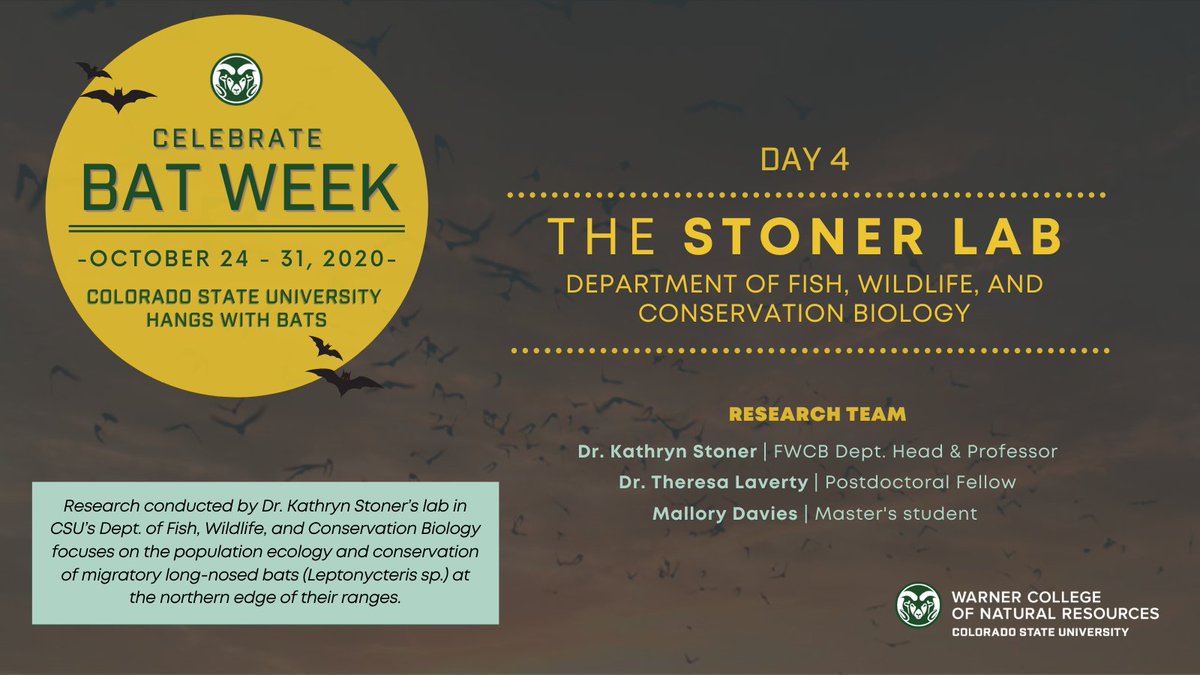 https://abs.twimg.com/emoji/v2/... draggable="false" alt="🦇" title="Fledermaus" aria-label="Emoji: Fledermaus">https://abs.twimg.com/emoji/v2/... draggable="false" alt="🦇" title="Fledermaus" aria-label="Emoji: Fledermaus">" title=" #BatWeek with CSU: Day 4! Today we feature research conducted by the Stoner Lab at the Warner College of Natural Resources focused on the population #ecology & #conservation of migratory long-nosed #bats. #CSUhangswithbats #BatWeek2020 https://abs.twimg.com/emoji/v2/... draggable="false" alt="🦇" title="Fledermaus" aria-label="Emoji: Fledermaus">https://abs.twimg.com/emoji/v2/... draggable="false" alt="🦇" title="Fledermaus" aria-label="Emoji: Fledermaus">https://abs.twimg.com/emoji/v2/... draggable="false" alt="🦇" title="Fledermaus" aria-label="Emoji: Fledermaus">" class="img-responsive" style="max-width:100%;"/>
https://abs.twimg.com/emoji/v2/... draggable="false" alt="🦇" title="Fledermaus" aria-label="Emoji: Fledermaus">https://abs.twimg.com/emoji/v2/... draggable="false" alt="🦇" title="Fledermaus" aria-label="Emoji: Fledermaus">" title=" #BatWeek with CSU: Day 4! Today we feature research conducted by the Stoner Lab at the Warner College of Natural Resources focused on the population #ecology & #conservation of migratory long-nosed #bats. #CSUhangswithbats #BatWeek2020 https://abs.twimg.com/emoji/v2/... draggable="false" alt="🦇" title="Fledermaus" aria-label="Emoji: Fledermaus">https://abs.twimg.com/emoji/v2/... draggable="false" alt="🦇" title="Fledermaus" aria-label="Emoji: Fledermaus">https://abs.twimg.com/emoji/v2/... draggable="false" alt="🦇" title="Fledermaus" aria-label="Emoji: Fledermaus">" class="img-responsive" style="max-width:100%;"/>
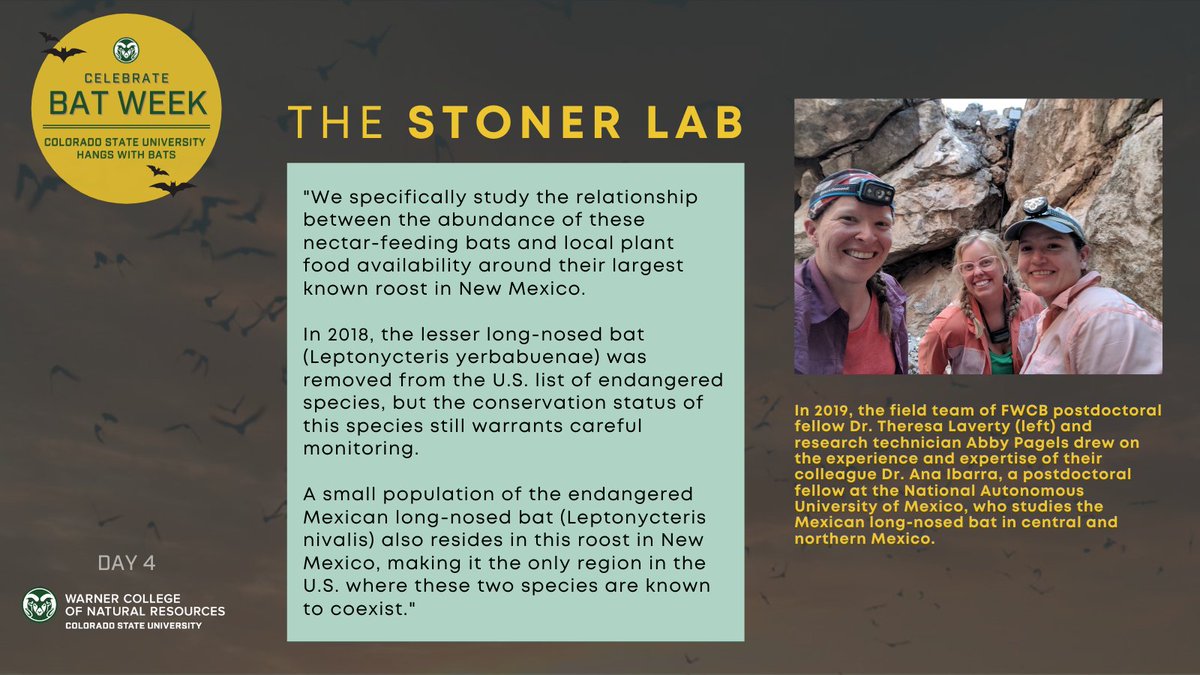
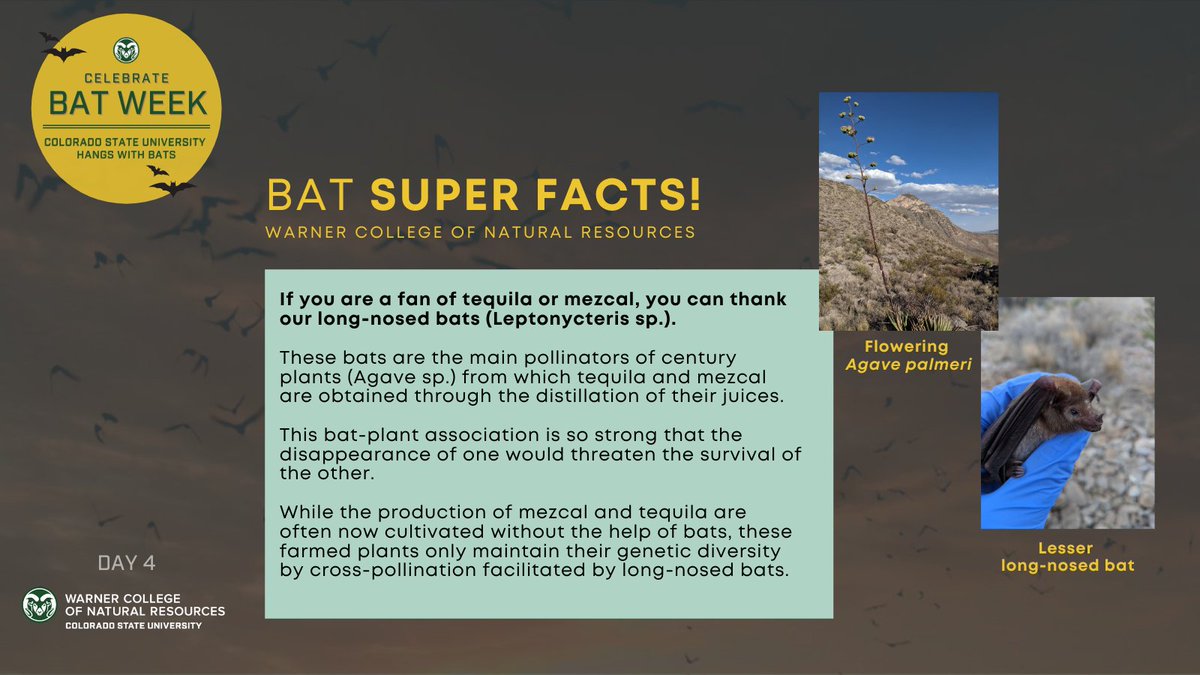 Learn why https://abs.twimg.com/emoji/v2/... draggable="false" alt="⬇️" title="Pfeil nach unten" aria-label="Emoji: Pfeil nach unten"> #CSUhangswithbats #BatWeek2020" title=" #Bat super facts! If you are a fan of tequila or mezcal, you can thank our long-nosed bats! https://abs.twimg.com/emoji/v2/... draggable="false" alt="⬇️" title="Pfeil nach unten" aria-label="Emoji: Pfeil nach unten"> Learn why https://abs.twimg.com/emoji/v2/... draggable="false" alt="⬇️" title="Pfeil nach unten" aria-label="Emoji: Pfeil nach unten"> #CSUhangswithbats #BatWeek2020" class="img-responsive" style="max-width:100%;"/>
Learn why https://abs.twimg.com/emoji/v2/... draggable="false" alt="⬇️" title="Pfeil nach unten" aria-label="Emoji: Pfeil nach unten"> #CSUhangswithbats #BatWeek2020" title=" #Bat super facts! If you are a fan of tequila or mezcal, you can thank our long-nosed bats! https://abs.twimg.com/emoji/v2/... draggable="false" alt="⬇️" title="Pfeil nach unten" aria-label="Emoji: Pfeil nach unten"> Learn why https://abs.twimg.com/emoji/v2/... draggable="false" alt="⬇️" title="Pfeil nach unten" aria-label="Emoji: Pfeil nach unten"> #CSUhangswithbats #BatWeek2020" class="img-responsive" style="max-width:100%;"/>

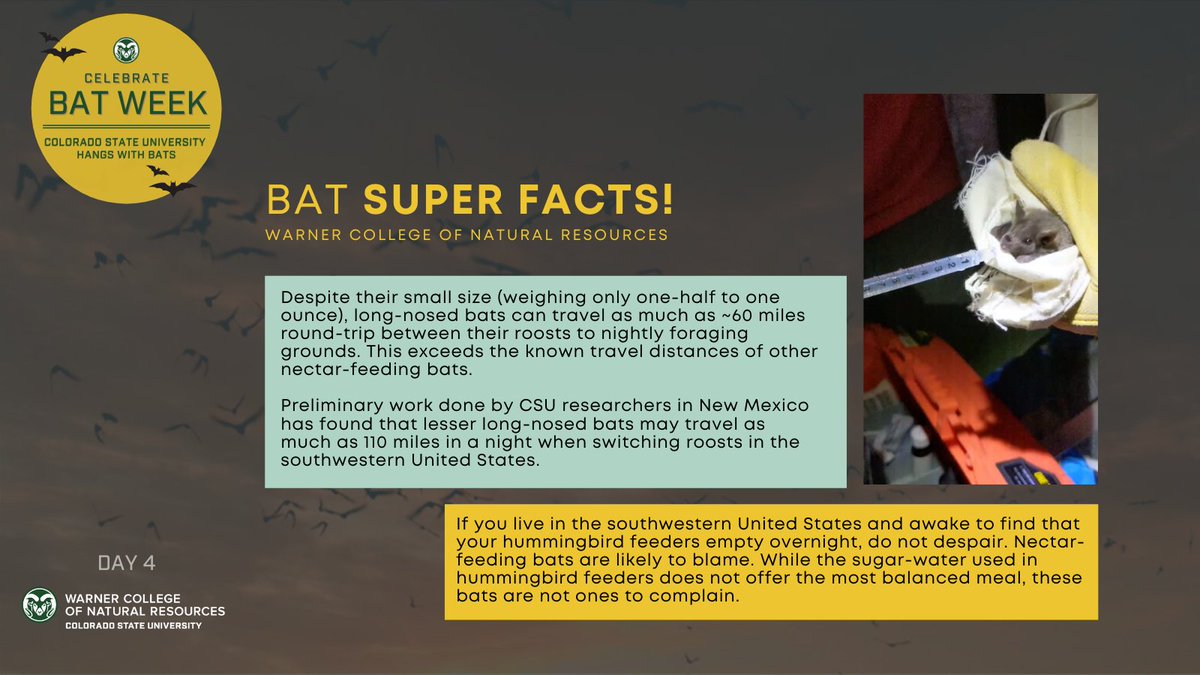
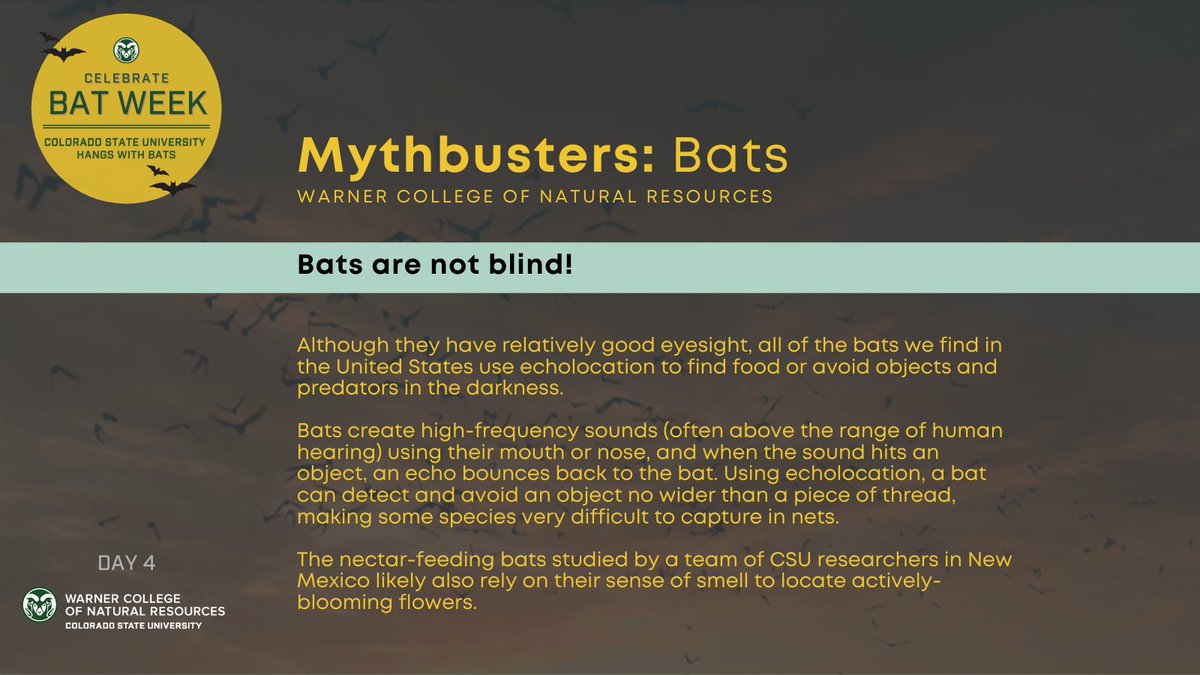 Learn morehttps://abs.twimg.com/emoji/v2/... draggable="false" alt="⬇️" title="Pfeil nach unten" aria-label="Emoji: Pfeil nach unten"> #CSUhangswithbats #BatWeek2020" title=" #Bat #myths busted by the Stoner Lab at CSU: Bats are not blind! https://abs.twimg.com/emoji/v2/... draggable="false" alt="⬇️" title="Pfeil nach unten" aria-label="Emoji: Pfeil nach unten">Learn morehttps://abs.twimg.com/emoji/v2/... draggable="false" alt="⬇️" title="Pfeil nach unten" aria-label="Emoji: Pfeil nach unten"> #CSUhangswithbats #BatWeek2020" class="img-responsive" style="max-width:100%;"/>
Learn morehttps://abs.twimg.com/emoji/v2/... draggable="false" alt="⬇️" title="Pfeil nach unten" aria-label="Emoji: Pfeil nach unten"> #CSUhangswithbats #BatWeek2020" title=" #Bat #myths busted by the Stoner Lab at CSU: Bats are not blind! https://abs.twimg.com/emoji/v2/... draggable="false" alt="⬇️" title="Pfeil nach unten" aria-label="Emoji: Pfeil nach unten">Learn morehttps://abs.twimg.com/emoji/v2/... draggable="false" alt="⬇️" title="Pfeil nach unten" aria-label="Emoji: Pfeil nach unten"> #CSUhangswithbats #BatWeek2020" class="img-responsive" style="max-width:100%;"/>
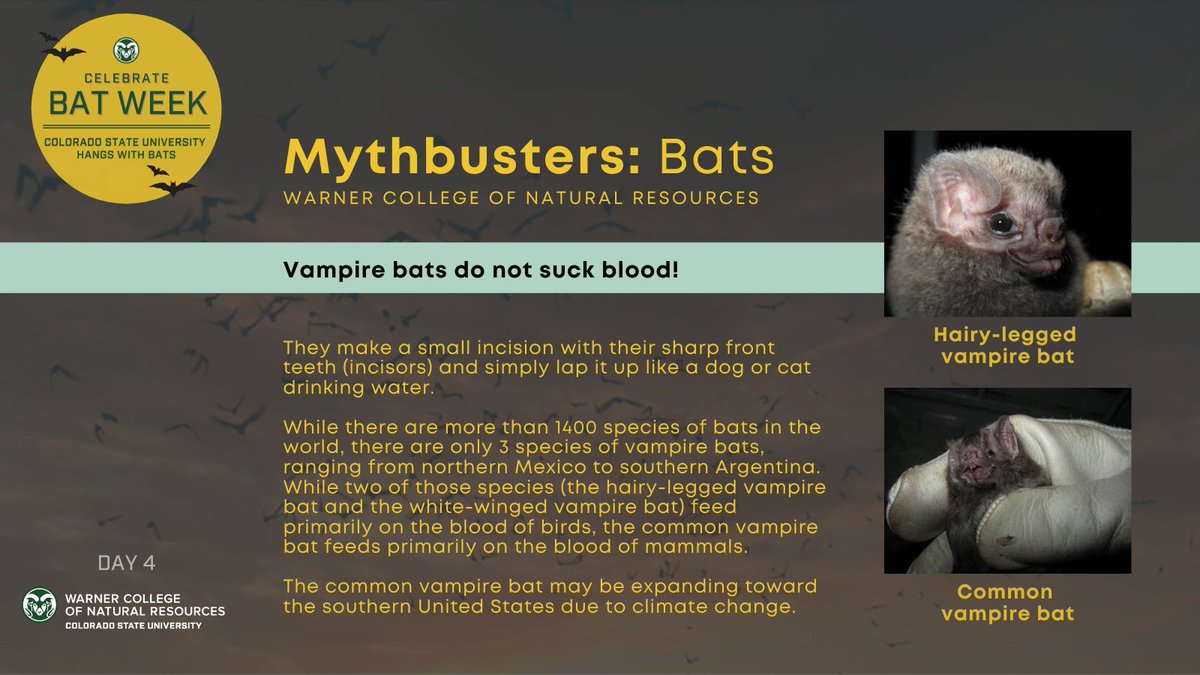 https://abs.twimg.com/emoji/v2/... draggable="false" alt="🧛" title="Vampir" aria-label="Emoji: Vampir">https://abs.twimg.com/emoji/v2/... draggable="false" alt="🦇" title="Fledermaus" aria-label="Emoji: Fledermaus"> Learn more https://abs.twimg.com/emoji/v2/... draggable="false" alt="⬇️" title="Pfeil nach unten" aria-label="Emoji: Pfeil nach unten"> #CSUhangswithbats #BatWeek2020" title=" #Bat #myths busted by the Stoner Lab at CSU: #Vampire bats do not suck blood! https://abs.twimg.com/emoji/v2/... draggable="false" alt="🚫" title=""Betreten verboten!"-Zeichen" aria-label="Emoji: "Betreten verboten!"-Zeichen">https://abs.twimg.com/emoji/v2/... draggable="false" alt="🧛" title="Vampir" aria-label="Emoji: Vampir">https://abs.twimg.com/emoji/v2/... draggable="false" alt="🦇" title="Fledermaus" aria-label="Emoji: Fledermaus"> Learn more https://abs.twimg.com/emoji/v2/... draggable="false" alt="⬇️" title="Pfeil nach unten" aria-label="Emoji: Pfeil nach unten"> #CSUhangswithbats #BatWeek2020" class="img-responsive" style="max-width:100%;"/>
https://abs.twimg.com/emoji/v2/... draggable="false" alt="🧛" title="Vampir" aria-label="Emoji: Vampir">https://abs.twimg.com/emoji/v2/... draggable="false" alt="🦇" title="Fledermaus" aria-label="Emoji: Fledermaus"> Learn more https://abs.twimg.com/emoji/v2/... draggable="false" alt="⬇️" title="Pfeil nach unten" aria-label="Emoji: Pfeil nach unten"> #CSUhangswithbats #BatWeek2020" title=" #Bat #myths busted by the Stoner Lab at CSU: #Vampire bats do not suck blood! https://abs.twimg.com/emoji/v2/... draggable="false" alt="🚫" title=""Betreten verboten!"-Zeichen" aria-label="Emoji: "Betreten verboten!"-Zeichen">https://abs.twimg.com/emoji/v2/... draggable="false" alt="🧛" title="Vampir" aria-label="Emoji: Vampir">https://abs.twimg.com/emoji/v2/... draggable="false" alt="🦇" title="Fledermaus" aria-label="Emoji: Fledermaus"> Learn more https://abs.twimg.com/emoji/v2/... draggable="false" alt="⬇️" title="Pfeil nach unten" aria-label="Emoji: Pfeil nach unten"> #CSUhangswithbats #BatWeek2020" class="img-responsive" style="max-width:100%;"/>
 https://abs.twimg.com/emoji/v2/... draggable="false" alt="🦇" title="Fledermaus" aria-label="Emoji: Fledermaus">https://abs.twimg.com/emoji/v2/... draggable="false" alt="🦇" title="Fledermaus" aria-label="Emoji: Fledermaus">" title="Happy #BatWeek2020! Join us each day this week to celebrate #BatWeek with experts from Warner College, @CSULiberalArts and @CSUVetMedBioSci! #CSUhangswithbats #BatWeek2020 https://abs.twimg.com/emoji/v2/... draggable="false" alt="🦇" title="Fledermaus" aria-label="Emoji: Fledermaus">https://abs.twimg.com/emoji/v2/... draggable="false" alt="🦇" title="Fledermaus" aria-label="Emoji: Fledermaus">https://abs.twimg.com/emoji/v2/... draggable="false" alt="🦇" title="Fledermaus" aria-label="Emoji: Fledermaus">" class="img-responsive" style="max-width:100%;"/>
https://abs.twimg.com/emoji/v2/... draggable="false" alt="🦇" title="Fledermaus" aria-label="Emoji: Fledermaus">https://abs.twimg.com/emoji/v2/... draggable="false" alt="🦇" title="Fledermaus" aria-label="Emoji: Fledermaus">" title="Happy #BatWeek2020! Join us each day this week to celebrate #BatWeek with experts from Warner College, @CSULiberalArts and @CSUVetMedBioSci! #CSUhangswithbats #BatWeek2020 https://abs.twimg.com/emoji/v2/... draggable="false" alt="🦇" title="Fledermaus" aria-label="Emoji: Fledermaus">https://abs.twimg.com/emoji/v2/... draggable="false" alt="🦇" title="Fledermaus" aria-label="Emoji: Fledermaus">https://abs.twimg.com/emoji/v2/... draggable="false" alt="🦇" title="Fledermaus" aria-label="Emoji: Fledermaus">" class="img-responsive" style="max-width:100%;"/>


